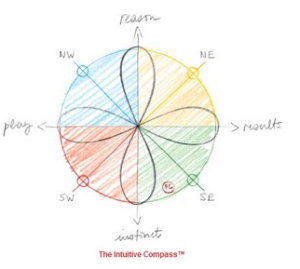 I know we promised you an decoding of your intuitive compass, and with our greatest apologies, it will come next week.
I know we promised you an decoding of your intuitive compass, and with our greatest apologies, it will come next week.
In the meantime…
Because our instinct is responsible for our survival, it actually makes complete sense for it to be heavily involved in sophisticated decisions. It has been doing that job for thousands of years. So it follows that, in important matters that will affect our lives, our instinct should be the first and foremost judge of whether or not a decision is good. A study conducted by neuroscientists at Princeton University confirms this fact. The aim of the study was to demonstrate how a gut feeling may rise before a person becomes conscious of what the brain has registered. In the study, students were directed to pick out figures—people or cars—in a series of photos that flashed by on a computer screen. The pictures flashed by four at a time, and the participants were told to scan only two of them, either those above and below the center point, or those to the left and right. Eye tracking confirmed that they did just that. But brain scans showed that the students’ brains registered the presence of people or cars even when the figures appeared in photos that they were not paying attention to. The brain tallies cues, big and small, consciously and not, it may send out an alarm before a person fully understands why.
A gut feeling is often the result of some part of our brain taking in and processing information that we are not conscious of having taken in and processed. This study demonstrates how we sometimes are not consciously aware of all of the information that we in fact have already registered at some level—in this case visually.
When a gut feeling arises before a person becomes conscious of it, it can enrich their ability to make a decision. Not only that, but sometimes logical problem solving is simply not the best option. Sometimes the best way to come up with an appropriate answer to a logical problem is to base it on a gut feeling. Dr. Gerd Gigerenzer, a psychologist who has studied the limits of rational thinking in decision making explains that, contrary to popular wisdom, sometimes there is no optimal strategy attainable to solve a problem. He gives the example of a presidential candidate who has to plan a fifty-city tour. The candidate would like to start and end in the same city and obviously cover the shortest distance. The candidate would like to start and end in the same city and obviously cover the shortest distance. There are so many possible itineraries that not even the fastest computer can optimize the candidate’s choice in a lifetime, a century, or even a millennium.
When optimization is out of reach we must rely on our gut feelings instead of logical deduction. And this applies to any situation in which rules are not completely explicit, uncertainty is prevalent, or rule breaking is an option. This obviously pertains to winning a negotiation, leading an organization, marketing a new product, investing in the stock market, or training executives. Of course, for every one of these endeavors good enough strategies exist, but for us to find and choose these valid strategies we need to resort to what Gigerenzer calls a “rule of thumb,” which he defines as the product of a mental process that tries to identify the most important information and ignore the rest, taking advantage of an evolved capacity of the brain to do so. For Gigerenzer, expert of the intelligence of the unconscious, “it would be erroneous to assume to intelligence is necessarily conscious and deliberate.” He adds, “We know more than we can tell.”
Excerpted from Francis Cholle’s The Intuitive Compass, Jossey-Bass










